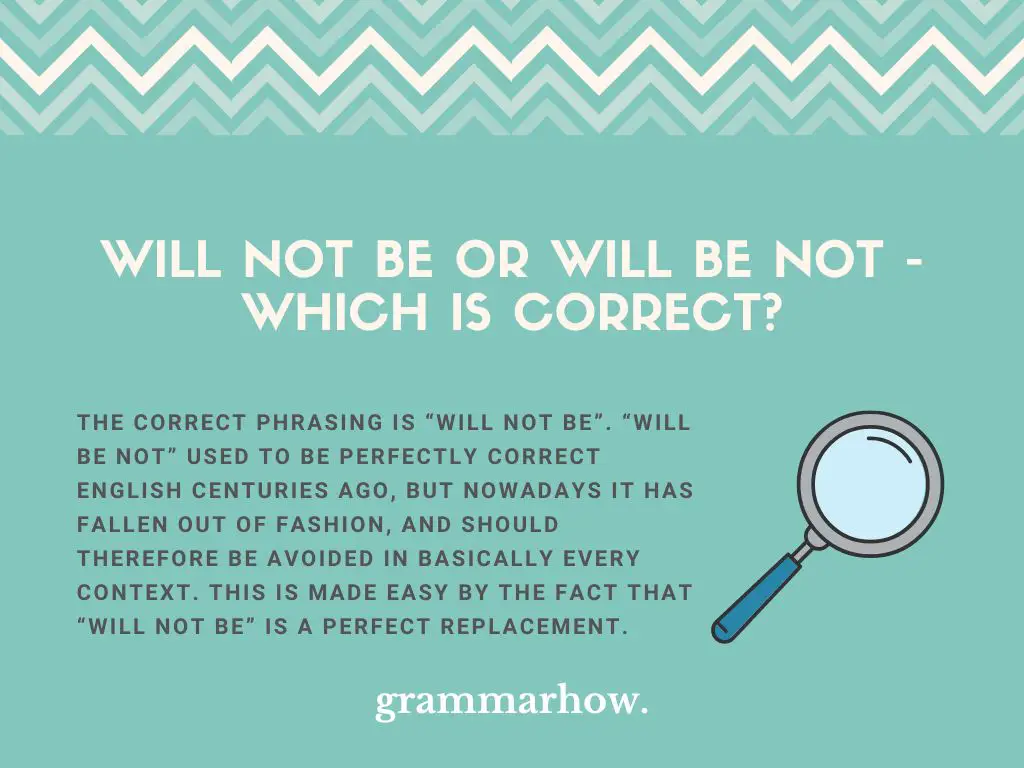Sometimes, you’ll find some words flipped in sentences where you wouldn’t expect them to be. In such situations, you’ll wonder if both phrasings are correct, or if you should only stick to one of them. This article will clarify whether you should say “will not be” or “will be not”.
Will Not Be or Will Be Not – Which Is Correct?
The correct phrasing is “will not be”. “Will be not” used to be perfectly correct English centuries ago, but nowadays it has fallen out of fashion, and should therefore be avoided in basically every context. This is made easy by the fact that “will not be” is a perfect replacement.

If you read a Shakespeare play, you might find “will be not” instead of “will not be”. However, the English language has changed a lot since the period in which Shakespeare wrote his plays.
Because of the way that languages work, their rules and systems are never set in stone. They are constantly changing and evolving with the times, and you can observe these changes.
If you were to start talking like a Shakespeare-written character in your daily life, people would be confused and have a hard time understanding you.
This is why “will be not” is considered incorrect nowadays, and you shouldn’t use it because of that fact.
Will Not Be
“Will not be” is the grammatically correct way to state that something is not going to be something else at an undefined point in the future. When you say “will not be” you’re very definitively stating that a thing is not going to be a certain way in the future.
“Will not be” does not specify a time, so you’re free to use it to refer to sometime in the next ten years, or to something that will occur a few hours from now.
The only condition, really, is that you’re talking about the future, and about how an object/person will not be a certain thing by then.
This can carry the implication that the object/person does fit the quality in the current moment, but will not in the future, but this isn’t necessarily the case.
Here are a few example sentences:
- I will not be busy by the time lunch comes, so maybe we can talk to each other then.
- He will not be working on the big project, just on some specific smaller tasks we need him for.
- She will not be in class at that time, because she doesn’t have classes on Thursdays.
- My aunt will not be in the house that day, so if you want to visit her don’t come on that day.
- They will not be releasing their picture at a reasonable time, I don’t think.
- I will not be at the office when the issue releases so I’ll have to wait until the night to read it.
- She will not be at the conference, because unfortunately she has a trip to make during it.
Will Be Not
“Will be not” is an outdated and incorrect phrasing used to state that something will not fit a certain category at an unspecified point in the future. Though this phrasing used to be significantly more popular, it hasn’t been in common use for centuries.
Putting the verb “to be” before “not” used to be a very regular thing to do in the English language. Over the centuries, this has changed, and what was correct before is no longer correct.
Here are a few example sentences that will show you how to not use this phrase:
- Incorrect: I will be not afraid when they come looking for me, and I will be strong instead.
- Incorrect: I will be not there, I’m afraid, because I will be at my office working on my book.
- Incorrect: She will be not present at the meeting, because she’s ill and couldn’t come to work.
- Incorrect: He will be not at the premiere because of a family emergency, though its nothing awful.
- Incorrect: They will be not at the World Cup, because their team failed to qualify for it.
- Incorrect: We will be not at the train station at the same time as them, because of our schedules.
- Incorrect: Their band will be not the same as ours, because we have hired different people for it.
Final Thoughts
Though “will be not” used to be perfectly regular English a few centuries ago, that is no longer the case. Nowadays, if you want to phrase the same idea in a grammatically correct way, you should simply use “will not be ” and not over complicate yourself.
You may also like: Won’t vs. Will Not: Difference Explained (Helpful Examples)

Martin holds a Master’s degree in Finance and International Business. He has six years of experience in professional communication with clients, executives, and colleagues. Furthermore, he has teaching experience from Aarhus University. Martin has been featured as an expert in communication and teaching on Forbes and Shopify. Read more about Martin here.
